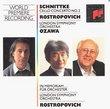| All Artists: Alfred Schnittke, Gennady Rozhdestvensky, USSR Ministry of Culture Symphony Orchestra Title: Schnittke: Concertos for Viola & Cello Members Wishing: 0 Total Copies: 0 Label: Regis Records Release Date: 6/24/2008 Genre: Classical Styles: Forms & Genres, Concertos, Instruments, Strings, Symphonies Number of Discs: 1 SwapaCD Credits: 1 UPC: 675754008932 |
Search - Alfred Schnittke, Gennady Rozhdestvensky, USSR Ministry of Culture Symphony Orchestra :: Schnittke: Concertos for Viola & Cello
 | Alfred Schnittke, Gennady Rozhdestvensky, USSR Ministry of Culture Symphony Orchestra Schnittke: Concertos for Viola & Cello Genre: Classical
|
CD DetailsSimilar CDs |
CD ReviewsGreat performances, but available elsewhere for less Christopher Culver | 08/28/2008 (3 out of 5 stars) "
This Regis disc contains two remarkable concertos by Russian composer Alfred Schnittke performed by the dedicatees themselves with the USSR Ministry of Culture Symphony Orchestra conducted by Gennady Rozhdestvensky. These very same Soviet-era recordings can be had on two discs in the Moscow Studio Archives series, along with two of his concerti grossi, and I'd recommend getting them there, a much more economical way of hearing some of his finest works. In the 1970s and early 1980s, Schnittke was exploring a method he called "polystylism", a Russian answer to postmodernism in which 20th-century techniques mingle effortlessly with quotations from the works of centuries past. The "Viola Concerto" (1985) is a fine example. It was written especially for Yuri Bashmet, the most renown violist of the 1980s and 1990s, and one credited with the rebirth of writing for the instrument. The concerto is in a standard three movements, but is noteworthy for using no violins, which lends a poignant tone to the work as it must depend on low strings. The opening movement is sorrowful, with an opening motive based on Bashmet's name. The middle movement is quintessential Schnittke, a blend of colours and styles (waltzes, military marches, elegies, romantic tearjeakers) that are incongruent yet strangely complementary to each other. However, the viola is battered by the many orchestral forces, and in the long, drawn-out last movement he slowly expires as from a mortal wound.The Viola Concerto is a downer, a piece that charts Schnittke's fascination with pain and death as well as anything else he wrote in the last fifteen years of his life. Bashmet has toured this one all over the world and recorded it numerous times with various ensembles, but this is as powerful a performance as they come. Later in 1985 Schnittke suffered the first of a series of disabling strokes, and his writing broke the connection with the past of the polystylism phase and became intensely personal. The "Cello Concerto No. 1" is one of the first works he wrote after the stroke, dedicating it to renown Russian cellist Natalya Gutman. The first three movements are closely connected with the viola concerto in that both involve "suicide by orchestra" for the soloist. The cellist weaves poignant melodies and seems involved in a search for truth, while the orchestra goes on with everyday brash notes. The confrontation between the two leaves the soloist drained of all strength, and at the end only the orchestra survives. But unlike the viola concerto there is a remarkable resurrection, for the fourth movement, "largo" and quite long at 13 minutes, has the cello rise through a passacaglia from death to victory. This is an incredible ending. I'm not a fan of all of the late Schnittke--works like the sixth symphony seem to go nowhere--but this concerto shows that even after 1985 he remained at the height of his powers. Again, these are worth hearing, but skip this Regis disc and get the MSA ones." |

 Track Listings (7) - Disc #1
Track Listings (7) - Disc #1